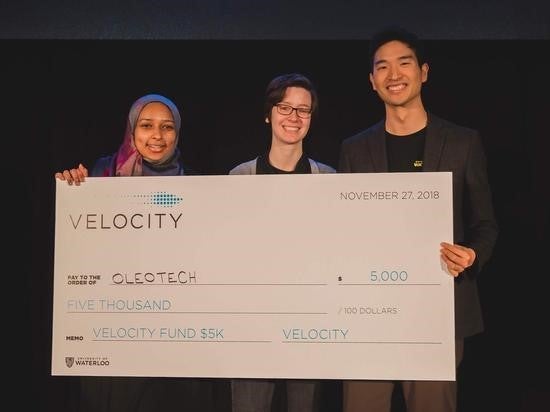Well before the Chemical Engineering Capstone Design Symposium took place in March, OleoTech was making the rounds, generating excitement and funding for the sorbent technology that they created for their fourth-year design project and developed into a startup venture.
For their Capstone project, students Sinclair K. Hidajat, Cassidy Molloy, Gene Shim, Zeinab Sidahmed and Timothy Yeung put their minds together to tackle a pervasive form of environmental pollution: contamination of water by the continuous low-concentration release of hydrocarbons into the environment through stormwater runoff.
Not as pretty as it looks
The ubiquitous rainbow sheen on puddles of water in the roadway is caused by droplets of gasoline, oils, asphalt and other petroleum-based substances that are common to our transportation infrastructure. Droplets of these oil-based fluids are eventually washed from the pavement and travel with runoff water through the storm drains and into ponds, streams and lakes, where they accumulate into large, troublesome amounts.
While some hydrocarbons are a natural occurrence in the environment, too many hydrocarbons can pose serious and long-term problems. For example, hydrocarbon can stick to the gills of fish, making it difficult for them to breathe; adhere to and destroy the algae and plankton that marine life depends on for nutrition; and affect the reproduction of plants, insects and fish. Excess hydrocarbons in our water will have far-reaching negative effects on our environment and our health.

The OleoTech Capstone Design Team (L-R): Cassidy Molloy, Zeinab Sidahmed, Sinclair K. Hidajat, Gene Shim and Timothy Yeung (not pictured)
Twofold impact
For their Capstone Design project, the OleoTech team sought to create a simple and cost-effective method for removing hydrocarbons from stormwater before it enters the environment. Using recycled tire polymer that attracts oil and repels water, they developed a sorbent that can be integrated into existing stormwater management systems. Then, they designed and tested various sorbent configurations in a lab-scale catch basin to identify the most efficient and cost-effective design. Their solution’s environmental impact is twofold: besides removing hydrocarbons from untreated water, it diverts end-of-life tires from the landfill.
Early success
In pursuit of their plans to market their sorbent technology after graduation, three members of the OleoTech team, Cassidy Molloy, Gene Shim and Zeinab Sidahmed, have been working hard – and successfully – to find the funds they need to begin testing their product. So far, they have been finalists in the Quantum Valley Investments® Problem Pitch, the Norman Esch Pitch Competition and the Palihapitiya Venture Creation Fund competition. They have also secured funding from the Engineer of the Future Fund and won a $5,000 Velocity Fund award to help them through the early startup stages.

(L-R): Zeinab Sidahmed, Cassidy Molloy and Gene Shim collect their Velocity Fund Finals award.
Congratulations to OleoTech, and all the best to them as they grow their business with the goal of seeing their products improve water quality in municipalities across Canada and around the world.
For more information about OleoTech, see some recent coverage of their accomplishments by Velocity and the Water Institute.